This is part 11 of the Early Church History class.
Have you heard of the Roman emperor Constantine? He had a massive impact on Christianity. Not only did he end the brutal persecutions of his predecessors, but he also used the Roman government to actively support the Church. However, his involvement also resulted in significant changes that eventually led to the merger between Church and State called Christendom. In this episode you’ll learn about the good and the bad effects of Constantine’s involvement in Christianity.
Listen to this episode on Spotify or Apple Podcasts
—— Links ——
- More podcasts about Constantine
- Get Kegan Chandler’s book, Constantine and the Divine Mind
- Find out more about this summer’s Family Camp here.
- More Restitutio resources on Christian history
- See other classes here
- Support Restitutio by donating here
- Join our Restitutio Facebook Group and follow Sean Finnegan on Twitter @RestitutioSF
- Leave a voice message via SpeakPipe with questions or comments and we may play them out on the air
- Intro music: Good Vibes by MBB Attribution-ShareAlike 3.0 Unported (CC BY-SA 3.0) Free Download / Stream: Music promoted by Audio Library.
- Who is Sean Finnegan? Read his bio here
—— Notes ——
Today, we’re looking at one of the most influential people in church history: Constantine (272-337).
- Also called Constantine the Great or Constantine I
- There would be 10 more emperors named Constantine.
- Constantine 11th was the last Roman emperor who died when the Muslims conquered Constantinople in 1453.
Constantine’s “Edict of Milan”[1]
- 303-313 – The Great Persecution
- 313 – Toleration granted to Christians and all religions
- Restore confiscated property
Constantine’s Favoring of Christianity
- Exemption from public office
- Tax exemption
- Use of cursus publicus
- Printing of Christian scriptures
- Closing of law courts on Sundays
- Abolition of face-branding as a punishment
Constantine and Churches
- Donated 3,000 bags of money to church in African provinces
- Rebuilt and enlarged damaged churches
- Built new churches, especially through his mother, Helena
- Helena also allegedly finds the true cross (relic).
Constantine’s Government
- Appointed government officials that were Christians
- Sought advice from Christian bishops on decisions
- Shared his table with Christians
- Had bishops accompany soldiers
Christian Attitude Toward Military Prior to Constantine
- Jesus and his apostles taught to love enemies (Matthew 5.5, 9, 38-48; 1 Thessalonians 5.15; Romans 12.14, 17-21; 1 Peter 3.8-11)
- Didache 1.3-4; Justin Martyr, First Apology 39, Irenaeus, Against Heresies 4.34, Tertullian, On Idolatry 19, Hippolytus, Apostolic Tradition 16.17-19, Origen, Against Celsus 5.33, Cyprian, Epistle I: To Donatus 6, Arnobius, Against the Heathen 1.6, Lactantius, Divine Institutes 5.8.[2]
- Preston Sprinkle: “Despite the presence of Christians in the military, it is clear that no single Christian writer before Constantine sanctioned the use of violence, not even toward bad guys.”[3]
Constantine’s Vision
- Had been a worshiper of Sol Invictus (Unconquered Sun)
- Allegedly saw something above the sun
- Had a dream in which Christ told him to use his initials, chi rho (also called, labarum), on his soldiers’ shields (“in this you will conquer”)
- At the battle of the Milvian Bridge, Constantine defeated Maxentius, fished his body out of the river, decapitated him, and paraded his head through the city on a stick.
Christian Leaders Seek Favor
- Christians requested the emperor to persecute other Christians.
- Constantine’s Edict Against the Heretics
- Novatians, Valentinians, Marcionites, Paulians, Cataphrygians
- Currying imperial favor to defeat one’s Christian enemies became a standard tactic.
The Constantinian shift initiated a new stage in church history—Christendom, the idea that a society or nation could be Christian. Before long, all infants would be baptized, making everyone a member of the church by birth. Everyone would be raised Christian. The government would pay clergy their salaries. How many of these so-called Christians followed Christ? Evangelism was no longer needed. The kingdom had come. The Roman Empire became the holy Roman Empire and was seen as God’s kingdom on earth.
Review
- Constantine’s involvement in Christianity brought several significant changes, both good and bad, initiating the “merger” of the church and the state known as Christendom.
- Constantine ended the persecution of Christians, issuing the Edict of Milan (along with Licinius) in 313.
- Constantine donated large sums of money to rebuild churches, build new churches, and support clergy.
- Constantine’s favoritism of Christianity incentivized people to join the church.
- Christians changed from discouraging military participation to blessing it.
- Christians pursued the emperor’s favor to persecute pagans, Jews, and other Christian sects with different beliefs.
- Constantine’s desire to have Christian advisors in his entourage caused some Christians to begin identifying the Roman Empire as God’s kingdom on earth.
- Rather than strict obedience to the teachings of Christ, Christendom came to lower the requirements for all, while the zealous left, pursued monasticism whether as isolated hermits or in communities.
[1] Scholars point out that the “Edict of Milan” was really a letter sent from Nicomedia.
[2] More quotations in David Bercot, Dictionary of Early Christian Beliefs.
[3] Preston Sprinkle, Fight (Colorado Springs, CO: David C Cook, 2013), 212-3.

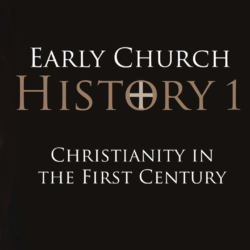
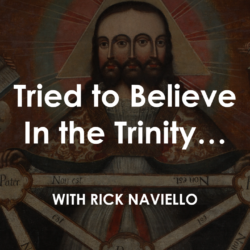
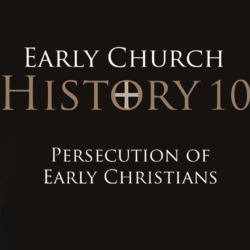
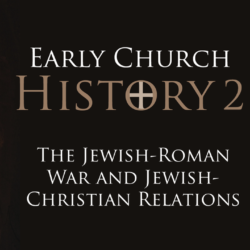
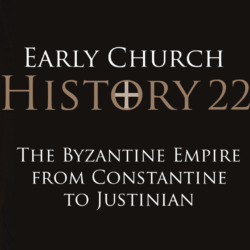
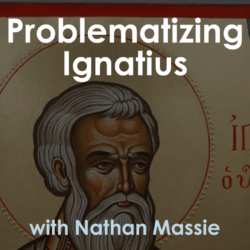
Excellent teaching Sean. Learned a few new things, and had some loose ends tidied up.
Hey Sean, love all this. I’m bolstering myself by listening to many, many of your podcasts on church history as I’m taking my “trinitarian” church history courses in seminary (ugh). I’m wondering what you have to say about the run-up to Constantine and the development of the “Just War” theory (and Augustine’s hand in that).
“Galerius had to undertake significant military campaigns, one along the Danube River and another against the Persians. Among the team of emperors, it seems that only Galerius had given any indication of enmity toward Christianity. The first difficulties probably arose in the army. There was no general agreement among Christians regarding military service, for, while most church leaders of the time said that Christians should not be soldiers, there were many believers among the legions. In any case, around the year 295 a number of Christians were condemned to death, some for refusing to join the army, and others for trying to leave it. Galerius viewed this attitude of Christians toward military service as a serious danger, for it was conceivable that at a critical moment Christians in the army would refuse to obey orders. Therefore, as a measure required for military morale, Galerius convinced Diocletian that all Christians should be expelled from the legions.” (Gonzalez, J. The Story of Christianity: Volume 1. Grand Rapids, MI: HarperCollins, 2014, chapter 12, paragraphs 2–3.)
I can see how, with the likes of leaders like Eusebius and Augustine, this stance of Rome being “holy” and God’s kingdom/arm of righteous justice on earth would get solidified into church policy/stance. I’d love for you to speak on the decades prior to Constantine that showed the shift away from passivism/nonviolence and why believers started abandoning the clear commands from Jesus and the apostles, which the early church stood by, even to martyrdom. Was it mostly just due to so much persecution in regions that the churches came up with ways to justify participating in wars? Thanks, and I love your article on nonviolence–everyone should read it!